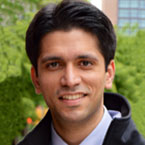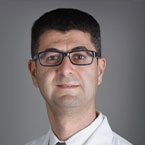By: Shahnawaz Amdani, MD, FACC, FAAP & Majd Makhoul, MD, FAAP, FACC, FASE
Rare and often underdiagnosed, cardiomyopathy is one of the common causes of
sudden cardiac death in children under the age of 18. Because the disease can be present without symptoms, families should be aware of any family members who have
heart disease or who die unexpectedly before age 50.
Here's what else you need to know about cardiomyopathy in children, teens and young adults.
What is cardiomyopathy?
Cardiomyopathy is a chronic heart condition that involves the deterioration of the heart muscle (myocardium). The heart muscle becomes abnormally shaped, thickened and/or stiffened.
Eventually the heart is unable to pump effectively and cannot supply the body with enough blood to function. In severe cases, cardiomyopathy can lead to heart failure or sudden death.
There are 5 forms of cardiomyopathy:
Dilated cardiomyopathy (DCM)
Hypertrophic cardiomyopathy (HCM)
Restrictive cardiomyopathy (RCM)
Arrhythmogenic right ventricular cardiomyopathy (ARCM)
Left ventricular non-compaction cardiomyopathy (LVNC)
Who gets cardiomyopathy?
Cardiomyopathy predominantly affects adults, but may also affect infants and children. According to the North American Pediatric Cardiomyopathy Registry, 1 to 1.5 out of 100,000 children in the U.S. is diagnosed with cardiomyopathy each year. This is a conservative number, though, because it does not include all types of cardiomyopathies. Cardiomyopathy can occur in any child regardless of age, gender, race, or economic background.
Causes of cardiomyopathy in children
There are many causes of cardiomyopathy in children, including some that are not fully understood. Common causes include:
Inheriting the condition from one or both parents
A viral infection
Some congenital and acquired cardiac abnormalities
Effect of
chemotherapy drugs
Metabolic, mitochondrial, or systemic diseases in parts of the body other than the heart
Persistent arrhythmia (abnormal heart rhythm)
Toxins affecting other organs
Despite advances in
genetic testing, the exact cause remains unknown in two-thirds of diagnosed children.
Symptoms of pediatric cardiomyopathy
Occasionally, symptoms of pediatric cardiomyopathy can be mistaken as a cold, flu, asthma attack, or stomachache. Some affected children have no symptoms while others may experience any of the following symptoms:
Shortness of breath or rapid breathing
Dizziness and
fainting
Irregular or rapid heartbeat
Abdominal bloating or swelling
Chest pain
Extreme fatigue
Infants may experience poor weight gain, extreme sleepiness, difficulty feeding or excessive sweating.
Warning signs of sudden cardiac arrest:
Recognizing the warning signs of sudden cardiac arrest is also important. If your child experiences any of the following, he or she should see a pediatric cardiologist for an extensive cardiac evaluation:
Chest pain or discomfort during physical activity
Fainting or near fainting without warning or during physical activity
Seizure without warning or during physical activity
Excessive fatigue associated with exercise
Unusually fast heart rate or rhythm with an unknown cause
How is pediatric cardiomyopathy diagnosed?
A
pediatric cardiologist confirms the diagnosis through an
echocardiogram (echo) and
electrocardiogram (EKG, or ECG). In some cases, other medical tests are necessary. Genetic testing may be recommended to investigate the underlying cause.
Since pediatric cardiomyopathy is rare, it is recommended to locate a children's medical center with a wide range of experience in managing children with cardiomyopathy. Early diagnosis and treatment of the disease is essential to preventing complications and progression to heart failure.
Treatment options for cardiomyopathy
There is no cure for cardiomyopathy yet, but the disease is treatable. Symptoms and complications can be well-controlled by medications, surgery, and/or implantable devices. The type of cardiomyopathy and its severity determines the treatment plan. It is important to talk to a cardiomyopathy specialist to determine the best treatment course for your child.
Medication is usually the first treatment option to improve the functioning of the heart.
An implantable cardioverter defibrillator (ICD) may be needed in children with irregular heart rhythms (arrhythmia).
A surgical procedure called a myectomy may relieve symptoms in children with HCM.
A ventricular assist device and heart transplant may be necessary if medical management is ineffective in children with advanced heart failure.
Genetic screening for cardiomyopathy
Cardiomyopathy is often genetic, so it is important to consider a family's inheritance risk and discuss family screening. A pediatric cardiologist and a
pediatric geneticist should work together to form a screening plan and discuss genetic testing options with your family.
How does a cariomyopathy diagnosis impact a child's lifestyle?
Although cardiomyopathy is a chronic condition, many children with cardiomyopathy lead a relatively normal life with few limitations. A diagnosis will likely involve more visits to the cardiologist and taking daily medications.
Other adjustments may include diet changes and school accommodations. Restriction from competitive or contact sports may be needed in a few cases, but these need to be made using a collaborative shared decision-making model between the patient, parent and pediatric cardiomyopathy specialist.
More information
About Dr. Amdani
 Shahnawaz Amdani, MD, FACC, FAAP, a member of the American Academy of Pediatrics Section on Cardiology and Cardiac Surgery, is a pediatric cardiomyopathy, heart failure and transplant cardiologist at Cleveland Clinic Children’s. There, he is the Medical Director of the Mechanical Circulatory Support program, as well as the Director of the Fontan Multi-disciplinary Clinic (FRONTIER Clinic) and Chair of the Fellow’s Research Scholarship Oversight Committee. Dr. Amdani is dedicated to improving the lives of children with varying forms of cardiomyopathy, those with heart failure in need of medical therapies and those with advanced heart failure who need advanced cardiac therapies (ventricular assist device and heart transplantation). Shahnawaz Amdani, MD, FACC, FAAP, a member of the American Academy of Pediatrics Section on Cardiology and Cardiac Surgery, is a pediatric cardiomyopathy, heart failure and transplant cardiologist at Cleveland Clinic Children’s. There, he is the Medical Director of the Mechanical Circulatory Support program, as well as the Director of the Fontan Multi-disciplinary Clinic (FRONTIER Clinic) and Chair of the Fellow’s Research Scholarship Oversight Committee. Dr. Amdani is dedicated to improving the lives of children with varying forms of cardiomyopathy, those with heart failure in need of medical therapies and those with advanced heart failure who need advanced cardiac therapies (ventricular assist device and heart transplantation).
|
About Dr. Makhoul
 Majd Makhoul, MD, FAAP, FACC, FASE, a member of the American Academy of Pediatrics Section on Cardiology and Cardiac Surgery, is a pediatric cardiologist with special interest in congenital cardiac imaging. Dr. Makhoul serves as the Medical Director of Pediatric Echocardiography Laboratory at Atrium Health Levine Children’s Hospital in Charlotte, NC. Dr. Makhoul is dedicated to improving the lives of children with varying forms of congenital and acquired heart diseases. His scholarly focus is on fetal cardiac imaging as well as quality improvement projects in congenital cardiology and cardiac imaging. Majd Makhoul, MD, FAAP, FACC, FASE, a member of the American Academy of Pediatrics Section on Cardiology and Cardiac Surgery, is a pediatric cardiologist with special interest in congenital cardiac imaging. Dr. Makhoul serves as the Medical Director of Pediatric Echocardiography Laboratory at Atrium Health Levine Children’s Hospital in Charlotte, NC. Dr. Makhoul is dedicated to improving the lives of children with varying forms of congenital and acquired heart diseases. His scholarly focus is on fetal cardiac imaging as well as quality improvement projects in congenital cardiology and cardiac imaging.
|